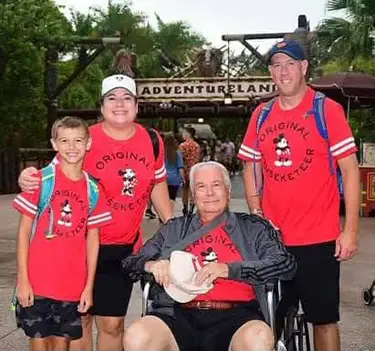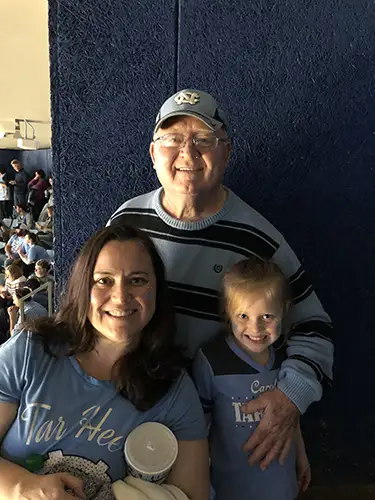
On any given afternoon, Natausha May might be rushing her son to cello lessons, driving across town to flush out her father’s catheter or making lesson plans for her students. A few miles away, Melinda Blitch finishes her workday at home, only to begin her second shift: bathing and caring for her father while getting dinner ready and helping her daughter with homework.
Welcome to the world of the “sandwich generation:” adults pressed between raising children and caring for aging parents. According to the Journal of the American Geriatrics Society, over 2.5 million Americans are in this situation. It’s a life of relentless scheduling, emotional whiplash and often overwhelming guilt. But as taxing as it can be on the caregiver, it is a labor of love.
For May, the transition into caregiving came unexpectedly in 2019. Her father, once a ballroom dance instructor with a vibrant social life in Savannah, Georgia, fell while trying to catch his wife from falling, and soon after, May and her husband began taking care of him. “We thought it would be short-term,” she said. “But then he was diagnosed with Parkinson’s. Everything changed very quickly.”
As her father’s condition declined, so did his independence. He moved into a local senior living community but soon required a level of care that pushed the limits. “We were hemorrhaging money. Assisted living was $8,000 a month, and we still had to hire extra help because they weren’t getting him to dinner on time or showering him regularly,” May shared.
Eventually, she moved her father to a more affordable and attentive facility, but the cost still looms. May is pleased with the facility workers and hospice care, but they are limited in what they can do because of the label of his level of care – a threshold that would more than double the monthly costs – so May still manages elements of his care like flushing the catheter.
All the while, she and her husband are raising their middle school-age son, Jackson, and supporting his involvement in golf, cello and taekwondo. “I feel guilt either way,” stated May. “I’m either missing time with my dad or I’m missing time with my family. It’s a constant balancing act.”

Melinda Blitch is a single mother caring for her 11-year-old daughter and her 78-year-old father who lives with them and suffers from dementia. Blitch’s caregiving journey started slowly; she recognized signs, tried to persuade her father to get tested and finally moved him in after a knee surgery caused a steep decline.
“I work remotely most days, but I still have a caregiver here full-time,” she explained. “At night, it’s all me. I get him to bed and deal with sundowning. He’s up every hour.”
There’s no such thing as clocking out. “I’m two years behind on my own doctor appointments,” Blitch admitted. “When I finish work, I’m not done. I’m a mom and a caregiver.” She also juggles her daughter’s two competitive travel sports.
Like May, Blitch had disheartening experiences with facility care. “He was at a nursing home for a short time,” she recounted. “They had a good reputation and were kind but understaffed. I feared I’d lose him there, just watching TV in a wheelchair all day.”
At home, Blitch said her father thrives. He walks, sits on the porch and lights up when he sees his granddaughter. “My daughter doesn’t always understand what’s going on, but I tell her that this is what family does. We take care of each other.”
Being part of the sandwich generation is an enormous weight. They wrestle with healthcare systems, finances, guilt and the emotional toll of watching their greatest heroes fade, all while balancing work and children.
“You feel like you have to be everywhere at once,” May said. “Some days I get in the car and just cry. He used to be so full of life; dancing and traveling. Now he just stares at the TV. It’s heartbreaking.”
Blitch felt a similar sentiment: “He was so full of life. He would pick me up after work and we would watch the sunset in his boat. Watching that slow loss is hard.”
The sandwich generation may be stretched thin, but they’re holding families together. If you find yourself caught in the middle, there are silver linings. Despite the overwhelming challenges, there is gratitude. “I’m thankful for this time,” May said. “Caring for my father has allowed me time with him that I would have never had if he stayed in Savannah.”
Blitch agreed. “It’s exhausting, yes. But my father’s still with us. He still lights up when he sees us. That’s worth so much.”
By Anne Toole


Leave a Reply